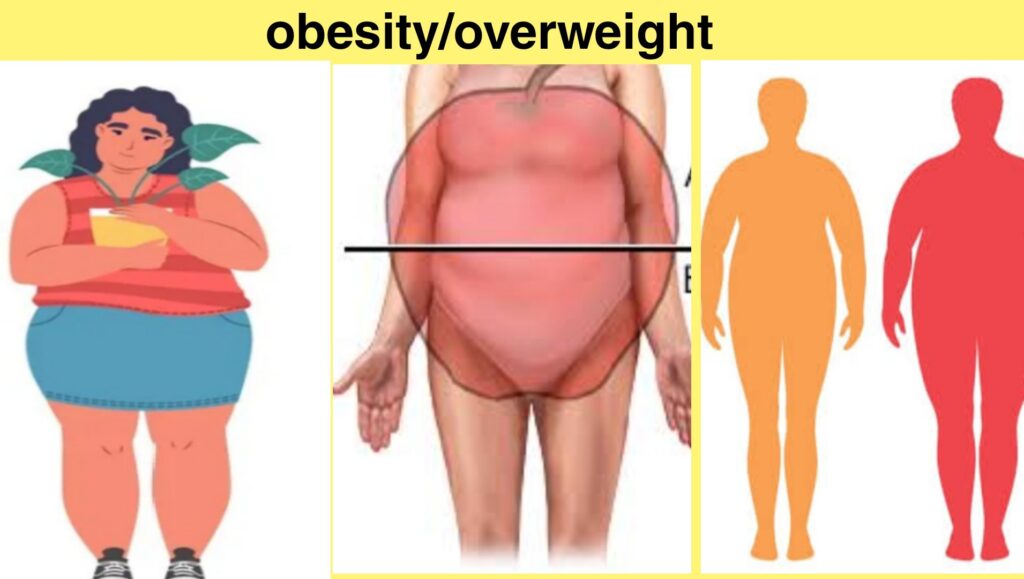What is Obesity?
Obesity: A disorder involving excessive body fat that increases the risk of health problems. Obesity is a common, serious chronic disease of adults and children. Obesity affects children as well as adults. Obesity is generally caused by eating too much fatty and junk food, and moving or exercising too littles. In adults, Obesity is considered when BMI scores greater than or equal to 30.

Overweight: overweight and obesity are defined as abnormal or excessive fat accumulation that may impair health.
BMI (Body Mass Index)
BMI: Body Mass Index is a simple index of Weight-for-Height that is commonly used to classify overweight and obesity in adults. It is defined as a person’s weight in kilograms divided by the square of his height in meters (kg/m2).
Causes
If you consume high amounts of energy, particularly fat and sugars, but do not burn off the energy through exercise and physical activity, much of the surplus energy will be stored by the body as fat.
- Eating large amounts of processed or fast food, and that’s high in fat and sugar.
- Eating out a lot, you may be tempted to also have a starter or dessert in a restaurant, and the food can be higher in fat and sugars.
- Drinking too many sugar drinks, and including soft drinks and fruit juice.
- Drinking too much alcohol, contains a lot of calories, and people who drink heavily are often overweight.
- Lack of physical activities, is another important factor related to obesity. Sedentary people burn fewer calories than people who are active.
- Diet high in simple carbohydrates, The role of carbohydrates in weight gain is not clear. Carbohydrates increase blood glucose levels. Which in turn stimulates insulin release by the pancreas.and Insulin promotes the growth of fat tissue and can cause weight gain.
- Overeating, overeating leads to weight gain especially if the diet is high in fat. Foods high in fat or sugar (for example fast food, and sweets, fried foods), have high energy density (a lot of calories in a small amount of food), Epidemiologic studies have shown that diets high in fat contribute to weight gain.
- Genetic, A person is more likely to develop obesity if one or both parents are obese. Genetic also affects hormones involved in fat regulation.
- Diseases, such as hypothyroidism insulin resistance, polycystic ovary syndrome, and Cushing’s syndrome, are also contributors to obesity.
- Lack of sleep– not getting enough sleep or getting too much sleep can cause changes in harmons that increase appetite. You may also carve foods high in calorie and carbohydrates which can contribute to weight gain.
Symptoms of Obesity
Common symptoms of Obesity in adults include.
- Inability to perform simple physical tasks you could easily perform before weight gain.
- Psychological issues such as negative self-esteem, depression, shame and social isolation.
- Pain, especially in the back and joints.
- Fatigue, which can range from mild to extreme.
- Excess body fat, particularly around the waist.
- Trouble sleeping.
- Snoring
- Sweating more than usual.
- Shortness of breath.
Common symptoms of Obesity in childhood including.
- Stretch marks on the hips and back.
- Fatty tissue deposits (may be noticeable in the breast area).
- Shortness of breath with physical activity.
- Sleep apnea.
- Gastroesophageal reflux disease.
- Low self-esteem.
- Orthopaedic problems such as flat feet or dislocated hips.
- Early puberty in biological females/ delayed puberty in biological males.
Complications
People with obesity are more likely to develop a number of potentially serious health problems including.
- Type-2 diabetes– obesity can affect the way the body uses insulin to control blood sugar levels. this raises the risk of insulin resistance and diabetes.
- Digestive problems- obesity increases the likelihood of developing heartburn, Gallbladder disease and liver problems.
- Heart disease and stroke- obesity makes you more likely to have high blood pressure and abnormal cholesterol levels. which are risk factors for heart disease and strokes.
- Certain cancer- obesity may increase the risk of cancer of the uterus, cervix, endometrium, ovary, breast, colon, rectum, esophagus, liver, gallbladder, pancreas, kidney and prostate.
- Osteoarthritis- obesity increases the stress placed on weight bearing joints, in addition to promoting inflammation within the body. These factors may lead to complications such as Osteoarthritis.
- Sleep apnea- from fat deposits in the neck and tongue the block airway.
I hope that you liked this articles.
Thanking you!!